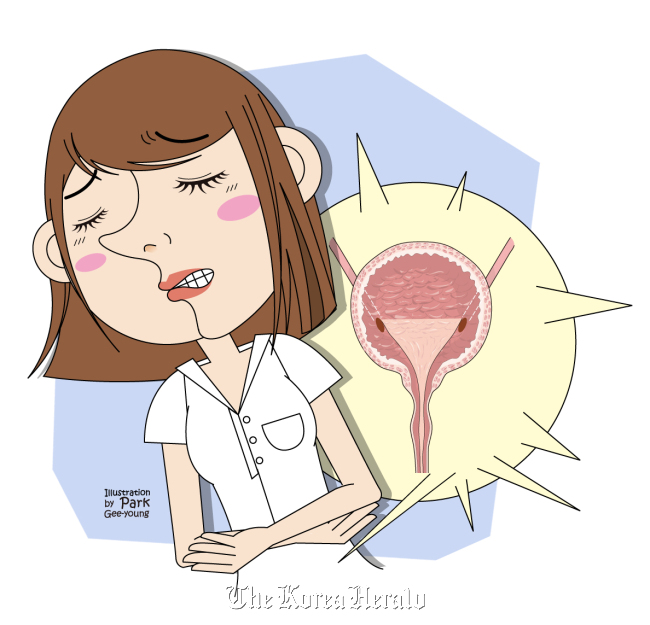
Cystitis is an inflammation of the bladder lining which can be caused by microorganisms (bacteria, protozoa or viruses), allergies, radiation and pharmacological agents. The most common mechanism of cystitis is bacterial infection through the urethra. Because women have shorter urethras than men, they are more prone to urinary tract infections.
This is because the bacteria from the urethra, vagina or the cervix can flow back to the bladder. In this case, the main bacterial organisms are those of the colon, namely E. coli. Other bacteria include staphylococci, Neisseria gonorrhea, Treponema pallidum and Trichomonas, which can all cause cystitis.
Women in the early stages of their marriage can develop what is known as the
“honeymoon cystitis,” which is caused by the transfer of bacteria from the anus to the vagina and the stimulation of the urethra during sexual intercourse. During pregnancy, the expanding uterus can put pressure on the bladder to induce increased urinary frequency which is a symptom similar to cystitis. Cystitis is less common in men. When there is increased residual urine, it can be due to prostatitis.
Cystitis can also be caused by stones, tumors or foreign bodies in the bladder. It can also be a complication of prolonged indwelling urinary catheter use in the hospital, or of surgeries. Stenosis of the lower urinary tract can also be a cause of cystitis. When there is a bacterial infection of the hydroureters or the kidneys, it is called pyelonephritis (upper urinary tract infection).
Urinary tract shows specific bladder stimulatory symptoms. These symptoms include pain on urination (dysuria), feeling of incomplete voiding, cloudy urine, uncomfortable lower abdomen and frequent urination (polyuria), without fever. If there is a fever, acute pyelonephritis should be suspected.
Acute cystitis has transient symptoms and responds well to treatment. However, chronic cystitis can be difficult to treat and the symptoms may persist. In females with chronic cystitis, the urine may not be cloudy but the increased urinary frequency and pain during urination may persist for a long period. When there is severe pain, the condition is known as interstitial cystitis.
An important complication is ascending infection of the kidneys. This is more common in pediatric patients or pregnant women, where vesicoureteral reflux can occur. The diagnosis is straightforward because of the subjective symptoms and urinalysis results (increased white blood cell count, epithelial cells and bacteria in the urine). When there is blood in the urine (hematuria), the condition is called hemorrhagic cystitis. Infective cystitis can be cured by taking antibiotics for 3-7 days. However, if there are other underlying causes, such as anatomical abnormalities, stones, tumor or stenosis, the underlying causes must be addressed. If there are other inflammations, such as urethritis, vaginitis or cervicitis, they must also be treated.
Acute cases can be treated effectively with pharmacological treatment, such as antibiotics for 3-5 days and taking a good rest. Chronic cases need to be treated for 3-6 months using various pharmacological agents. When there is no improvement, it is best to consult your doctor.
If you are not seeing a doctor, it is best to increase your water intake so that your daily urine output is approximately 1.5 liters. Water will dilute the urine and help excrete it faster to decrease the bacterial load in the bladder. When there is a fever, you should rest and take a warm bath if you experience any pain. Using a warm hot-water bottle to warm the lower abdomen can also help by improving the blood flow. Wear loose, cotton underwear and maintain a dry and clean environment. Alcohol and caffeine can stimulate the bladder so avoid consuming these. Taking anti-inflammatory agents such as aspirin before going to bed can also help.
The most important thing is to maintain good personal hygiene, take plenty of fluids, remain warm and treat constipation. It is important that you wash yourself before sexual intercourse and urinate straight after intercourse. If you experience cystitis more than 4 times a year, taking medication to improve the immunity or prophylactic antibiotics may help.

By Lee Kyu-sung
The author is a doctor at the department of urology at Samsung Medical Center and a professor of Sungkyunkwan University School of Medicine. ― Ed.





![[KH Explains] No more 'Michael' at Kakao Games](http://res.heraldm.com/phpwas/restmb_idxmake.php?idx=644&simg=/content/image/2024/04/28/20240428050183_0.jpg&u=20240428180321)




![[Grace Kao] Hybe vs. Ador: Inspiration, imitation and plagiarism](http://res.heraldm.com/phpwas/restmb_idxmake.php?idx=644&simg=/content/image/2024/04/28/20240428050220_0.jpg&u=)








